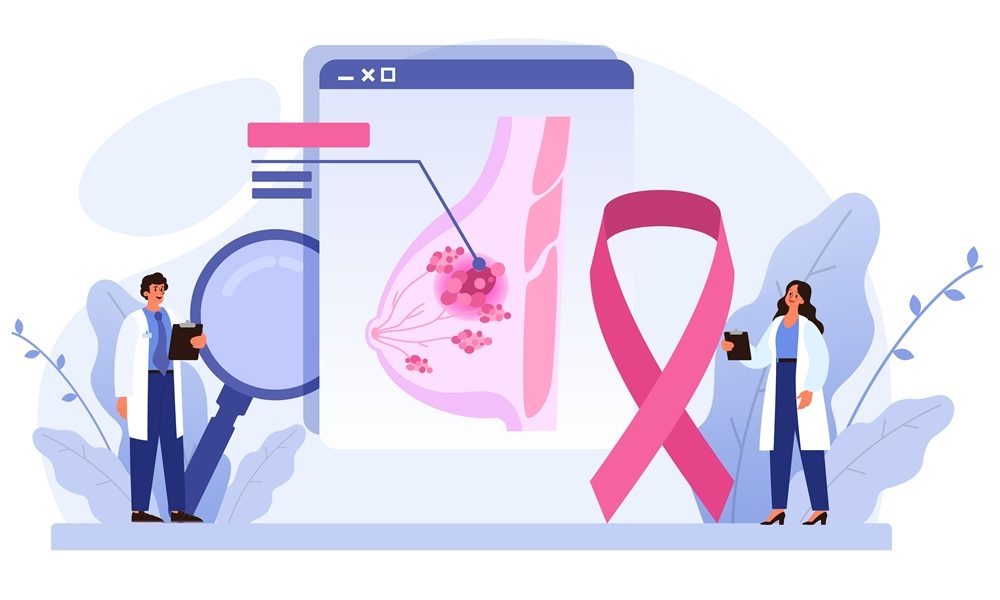Whole genome sequencing could identify unique genetic features to guide treatment for more than 15,000 breast cancer patients each year in the UK.
The technique, which analyses DNA from both patient and tumour to identify genetic changes, helps reveal what drives each cancer and highlights potential treatment targets or resistance.
Scientists at the University of Cambridge used data from almost 2,500 women across England held in the National Genomic Research Library – one of the world’s largest resources of its kind, run by Genomics England. The data came from the 100,000 Genomes Project and was linked to clinical and mortality records, tracking outcomes over five years.
They found that 27 per cent of breast cancer cases had genetic features that could help guide personalised treatment immediately, either using existing drugs or through clinical trials – equivalent to more than 15,000 women a year in the UK.
Among the key findings were HRD (homology-directed repair deficiency) – a DNA repair issue found in 12 per cent of breast cancers – unique mutations that could be targeted with specific drugs, signs of resistance to hormone therapy, and mutational patterns suggesting weaknesses that treatments could exploit.
An additional 15 per cent of cases had features useful for future research, such as problems in other DNA repair pathways, equating to about 8,300 women a year.
The analysis also offered insights into prognosis. In ER+HER2– breast cancers – the most common subtype, accounting for roughly 70 per cent of diagnoses – researchers found strong genetic indicators of tumour aggressiveness. Major structural DNA changes, APOBEC mutational signatures (a form of DNA damage) and mutations in the cancer gene TP53 were all linked to higher death risk.
These genetic markers proved more predictive than traditional measures such as age, cancer stage or tumour grade.
Using these results, the researchers developed a framework to help clinicians identify which patients need more aggressive treatment and which could safely have less. Around 7,500 women a year with low-grade tumours could benefit from more intensive therapy.
Professor Serena Nik-Zainal, from the Department of Genomic Medicine and Early Cancer Institute at the University of Cambridge, said: “The UK is a genuine world-leader in its ability to do whole genome sequencing through the NHS Genomic Medicine Service. Now that we have population-level evidence of how impactful whole-genome sequencing could be, we have the potential to make a difference to thousands of patients’ lives every year, helping tailor their care more precisely, giving more treatment to those who need it and less to those who don’t.”
She added: “It is becoming increasingly possible to use whole genome sequencing to inform cancer management, but it’s arguably not being used to its full potential, and certainly not for some of the more common types of cancer. Part of the reason why is because we lack the clinical studies to support its use, but it’s also because the information is so rich – sometimes almost too overwhelming to interpret.”
Whole genome sequencing could also transform how patients are matched to clinical trials, helping speed up the development of new treatments.
Professor Nik-Zainal said: “At the moment, we test patients for just a small number of genetic mutations and may invite them to join a clinical trial if the patient has a mutation that matches the trial’s target. But if we have their entire genetic readout instead, we will no longer be restricted to single trials with a specific target. We could massively open up the potential for recruitment, to multiple clinical trials in parallel, making recruitment more efficient and ultimately getting the right therapies to the right patients much faster.”
Professor Matt Brown, chief scientific officer of Genomics England, said: “This promising research further demonstrates the potential of genomics in improving cancer treatment outcomes for many people.
“Rapid advances in genomics are already ushering in the next generation of personalised cancer medicine. Not only can a patient’s genes guide precision treatment decisions that will best serve them, but we could improve how we match people up to clinical trials and help more patients access innovative treatments.
“Research like this highlights the value of the National Genomic Research Library and how understanding our genes can provide a real boost to the way we diagnose and treat disease. It’s all thanks to the contribution of participants and NHS partners in the 100,000 Genomes Project – the consented clinical and genomic data opens the door for incredible research opportunities.”
Although sequencing costs are falling – with Ultima Genomics recently announcing it can sequence a human genome for US$100 – whole genome sequencing is not yet widely used across the NHS. It is currently available through the NHS Genomic Medicine Service for certain adult, rare, paediatric and metastatic cancers.
Globally, 2.3 million women were diagnosed with breast cancer in 2022, with 670,000 deaths. Despite significant progress, accurately predicting which patients will respond best to treatment remains a challenge.
The study was largely funded by the National Institute for Health and Care Research, the Breast Cancer Research Foundation, the Gray Foundation and Cancer Research UK, with additional support from the NIHR Cambridge Biomedical Research Centre.
Twitter LinkedIn Facebook WhatsApp


